Nutrition - To Nourish in the New Year
by Beth Biggee, MD
“Just as food causes chronic disease, it can be the most powerful cure.”
Nutrition is from the Latin word “nutrire”, meaning to nourish. Nutrition is not just what you eat, but how you chose, obtain, and prepare food. Nutrition is how you physically eat, when you eat, and when you don’t eat for example time restricted eating or fasting.
Diet comes from the Greek word “diaita”, meaning way of life. Most of us define diet as a specific food plan to achieve a certain goal. I challenge us in the new year to think of nutrition as nourishing self and to think of diet as a way of life.
There are plenty of nutritional plans and diet fads popping up in every corner of the health care system weekly it seems. The one I follow is Andrew Weil’s anti-inflammatory Mediterranean diet. This is not a fad or short term diet solution. It is a way of life.
The focus here is consuming unprocessed mostly plant based foods such as many fruits, vegetables, legumes, whole grains, nuts, seeds, and fish. The use of olive oil as the principal source of oil (mono-saturated fat) is also a staple. The Mediterranean diet minimizes animal protein except for increasing omega-3 fatty acid intake by eating more cold water fish, (wild caught salmon, mackerel, anchovies, sardines, herring SMASH). See the environmental working groups fish list for information to help avoid excessive mercury exposure or you can use a seafood ap to learn and monitor healthy sources of fish.
This diet is low in animal protein including low dairy products. Fiber is also emphasized by eating 7-9 fruits and vegetables a day and whole grains. This diet or way of life avoids fried or processed food, added sugar, preservatives, and partially hydrogenated oils.
A Mediterranean diet has been shown in many clinical studies to reduce cardiovascular disease, cancer, and diabetes risk. (Lyon Heart Study and PREDIMED study)
The American College of Lifestyle Medicine also recommends a whole foods diet, mostly plants. Many studies show that the more plants you eat, the better your health outcome. Diets high in animal protein, particularly processed meats, lead to poorer health outcomes. (JAMA article 2020) Plant based is not the same as vegetarian or vegan diets. It emphasizes plants in abundance and minimized processed foods and animal proteins but does allows for some healthy animal proteins on occasion.
I also encourage eating mindfully. This includes choosing your food wisely, with intention in preparation. Enjoy the meal slowly, peacefully, and with gratitude among family and friends. I also follow Ayurveda advice and eat the largest meal midday and avoid eating after 7pm or sunset to allow my body to metabolize the food.
Eat well and wisely.
Beth Biggee, MD

